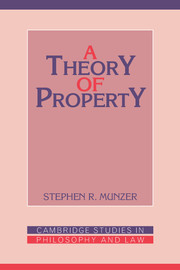Book contents
- Frontmatter
- Contents
- Preface and acknowledgments
- 1 Property, justification, and evaluation
- Part I Property rights and personal rights
- Part II From individuals to social context
- 4 Incorporation and projection
- 5 Control, privacy, and individuality
- 6 Property and moral character
- 7 Alienation, exploitation, and power
- Part III Justification and distributive equity
- Part IV Applications
- Table of cases
- Index of names
- Index of subjects
7 - Alienation, exploitation, and power
Published online by Cambridge University Press: 05 June 2012
- Frontmatter
- Contents
- Preface and acknowledgments
- 1 Property, justification, and evaluation
- Part I Property rights and personal rights
- Part II From individuals to social context
- 4 Incorporation and projection
- 5 Control, privacy, and individuality
- 6 Property and moral character
- 7 Alienation, exploitation, and power
- Part III Justification and distributive equity
- Part IV Applications
- Table of cases
- Index of names
- Index of subjects
Summary
THE PROGRAM
One must reckon with the bad as well as the good. The three previous chapters identify some good things that property, and specifically private property, helps to accomplish: the development of personality; the securing of control, privacy, and individuality; the fostering of some beneficial character traits. Even these chapters point out some undesirable aspects of property institutions. Yet anyone who sees private property as a downright nasty affair will object that the main complaints have yet to be addressed. What about alienation, exploitation, and the misuse of power? Since Marx, at least, must not these possible consequences of private property be taken into account?
Indeed they must. No acceptable background theory of property institutions can ignore them. Therefore, this chapter aims to relate property, alienation, exploitation, and power in a full social context. It suggests that though private property can do some bad things, it need not do them or at least do so many of them as to rule out all arrangements of private property. The chapter supplies, then, the final part of the background theory needed to begin the difficult task of formulating explicit principles to justify, and limit, property.
The discussion follows this path. Just as referring to intellectual history proved helpful in developing an account of property and moral character, so will it also in elaborating the themes of this chapter – though, once again, the survey cannot achieve great depth.
- Type
- Chapter
- Information
- A Theory of Property , pp. 148 - 188Publisher: Cambridge University PressPrint publication year: 1990

